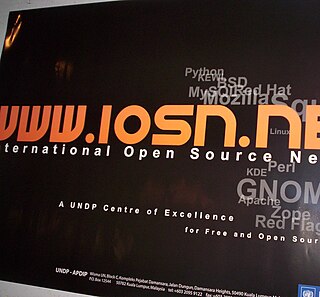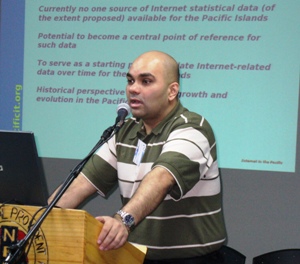Countries covered
The countries covered by APDIP were those supported by UNDP's Regional Bureau for Asia and the Pacific (RBAS): Afghanistan, Bangladesh, Bhutan, Brunei Darussalam, Cambodia, China, Cook Islands, Democratic People's Republic of Korea, East Timor, Fiji, Federated States of Micronesia, French Polynesia, India, Indonesia, Iran, Kiribati, Laos, Malaysia, Maldives, Mongolia, Myanmar, Nauru, Nepal, New Caledonia, Niue, Pakistan, Palau, Papua New Guinea, Philippines, Republic of Marshall Islands, Republic of Korea, Singapore, Solomon Islands, Sri Lanka, Thailand, Tokelau, Tonga, Trust Territories of the Pacific Islands, Tuvalu, Vanuatu and Vietnam.

The United Nations Development Programme (UNDP) is the United Nations' global development network. It promotes technical and investment cooperation among nations and advocates for change and connects countries to knowledge, experience and resources to help people build a better life for themselves. The UNDP provides expert advice, training and grants support to developing countries, with increasing emphasis on assistance to the least developed countries. UNDP works with nations on their own solutions to global and national development challenges. As they develop local capacity, they draw on the people of UNDP and its wide range of partners. However UNDP offers to help only if the different nations request it to do so.
The Association for Progressive Communications (APC) is an international network of organizations that was founded in 1990 to provide communication infrastructure, including Internet-based applications, to groups and individuals who work for peace, human rights, protection of the environment, and sustainability. Pioneering the use of ICTs for civil society, especially in developing countries, APC were often the first providers of Internet in their member countries.

A telecentre is a public place where people can access computers, the Internet, and other digital technologies that enable them to gather information, create, learn, and communicate with others while they develop essential digital skills. Telecentres exist in almost every country, although they sometimes go by a different names including public internet access center (PIAP), village knowledge center, infocenter, Telecottage, Electronic Village Hall, community technology center (CTC), community multimedia center (CMC), multipurpose community telecentre (MCT), Common/Citizen Service Centre (CSC) and school-based telecentre. While each telecentre is different, their common focus is on the use of digital technologies to support community, economic, educational, and social development—reducing isolation, bridging the digital divide, promoting health issues, creating economic opportunities, and reaching out to youth for example.
The Free and Open Source Software Asia-Pacific Consultation, or FOSSAP, was an event promoting free and open source software held twice in Asia, in 2004 and 2005. The first event was held in March 2004 in Kuala Lumpur, Malaysia, while the second event was held in September 2005 in Siem Reap, Cambodia.

The International Open Source Network has as its slogan "software freedom for all". It is a Centre of Excellence for free software in the Asia-Pacific region.

The Technical Centre for Agricultural and Rural Cooperation ACP-EU (CTA) was established in 1983 under the Lomé Convention between the African, Caribbean and Pacific Group of States and EU member states. Since 2000 CTA has operated within the framework of the ACP-EU Cotonou Agreement with a mission to “strengthen policy and institutional capacity development and information and communication management capacities of ACP agricultural and rural development organisations. It assists such organisations in formulating and implementing policies and programmes to reduce poverty, promote [[sustainable food systems|sustainable food security, preserve the natural resource base and thus contribute to building self-reliance in ACP rural and agricultural development.”. The centre is closed in 2020, after the end of the Cotonou Agreement and the subsequent end of its financing.

Rajnesh Dhirendra Singh is a Fijian entrepreneur and engineer. He holds several positions in the regional and international Information and Communications Technology community including the Internet Society and IPv6 Forum, and is an active Internet advocate and speaker on Internet technologies.
Information and communication technology in agriculture, also known as e-agriculture, focuses on the enhancement of agricultural and rural development through improved information and communication processes. More specifically, e-agriculture involves the conceptualization, design, development, evaluation and application of innovative ways to use information and communication technologies (ICTs) in the rural domain, with a primary focus on agriculture. ICT includes devices, networks, mobiles, services and applications; these range from innovative Internet-era technologies and sensors to other pre-existing aids such as fixed telephones, televisions, radios and satellites. Provisions of standards, norms, methodologies, and tools as well as development of individual and institutional capacities, and policy support are all key components of e-agriculture.
People First Network, also known as PFNet or Pipol Fastaem, started in Solomon Islands as part of UNDP's Solomon Islands Development Administration Planning programme (SIDAPP) and was developed by technical advisor David Leeming, Randall Biliki and others from January 2001. People First Network was initially a series of email stations around the Solomon Islands. The network provides email and other services to very remote rural areas. In particular the project was started as a means to link people to peacemakers following the ethnic tension and civil unrest in 2000, by providing rural communications and participatory news and information service.
The Commonwealth Youth Programme, also known as CYP, is an international development agency working with young people between the ages of 15 and 29. Part of the Commonwealth Secretariat, CYP is active in the Commonwealth's 54 member countries. CYP has a head office in London with four centres in Africa, Lusaka, Zambia, Asia Chandigarh, India, Caribbean Georgetown, Guyana and Pacific Honiara, Solomon Islands. Currently there are Four Regional Directors and 16 programme officers plus support staff are working there.

Dr. Noeleen Heyzer is a Singaporean social scientist who was Under-Secretary-General of the United Nations and Executive Secretary of the United Nations Economic and Social Commission for Asia and the Pacific (ESCAP). She was the first woman to hold the latter position since ESCAP's founding in 1947. She is currently Lee Kong Chian Distinguished Fellow at the SMU School of Social Sciences. She was also the United Nations Secretary-General’s Special Adviser for Timor-Leste, working to support peace-building, state-building, and sustainable development. In 2005, she was nominated for the Nobel Peace Prize in recognition of her struggle to improve the lives of women, while always promoting peace and justice.

Partnerships in Environmental Management for the Seas of East Asia or PEMSEA is a regional partnership programme implemented by the United Nations Development Programme (UNDP) and executed by the United Nations Office for Project Services (UNOPS). The project, started in 1994, was originally known as Prevention and Management of Marine Pollution in the East Asian Seas (SDS-SEA).
The International Vaccine Institute (IVI) is an independent, nonprofit, international organization that was founded on the belief that the health of children in developing countries can be dramatically improved by the use of new and improved vaccines. Working in collaboration with the international scientific community, public health organizations, governments, and industry, IVI is involved in all areas of the vaccine spectrum – from new vaccine design in the laboratory to vaccine development and evaluation in the field to facilitating sustainable introduction of vaccines in countries where they are most needed.
Asia Source was an event series that promoted and coordinated the use of free and open-source software (FOSS) in Asia. It took place three times: the first event was hosted in Bangalore, India in 2005, the second in Sukabumi in West Java, Indonesia in January 2007. The third event was held in Silang, Cavite in the Philippines.

The Asia-Pacific Telecentre Network (APTN) is a collaborative initiative of the United Nations Economic and Social Commission for Asia and the Pacific (UN-ESCAP) and telecentre.org. The APTN Secretariat is hosted at ICT Agency of Sri Lanka (ICTA). APTN is dedicated to promote innovation and knowledge sharing amongst telecentres in the Asia-Pacific region where telecentres are growing exponentially each year. APTN is working towards creating a platform of networks of telecentres, to share experiences on issues of their interest and to cooperate on the development of solutions for common problems of the telecentres themselves in order to empower poor and disadvantaged communities with Information and Communication Technology (ICT) in the Asia Pacific Region. In other words, APTN will serve as the focal network or the knowledge hub for communication and information technology in the Asia Pacific region.
Nalaka Gunawardene trained as a science writer, he has worked as a journalist, broadcaster and development communicator since 1987.

The Asian Forum of Parliamentarians on Population and Development (AFPPD) is a regional non-governmental organization (NGO) that serves as a coordinating body of 29 National Committees of Parliamentarians on Population and Development in Asia-Pacific. The objective of the organization is to strengthen the regional network of parliamentarians who are committed to implementing the population and development agenda, particularly the Programme of Action of the International Conference on Population and Development and the Sustainable Development Goals (SDGs). AFPPD aims to achieve this through capacity building for parliamentarians and National Committees.
Edouard Adrien André Wattez is a French United Nations diplomat who worked for the United Nations for more than 32 years in the Asia-Pacific, Africa and Middle East Regions in the United Nations Development Programme (UNDP) agency, leading assignments mainly in crisis, peace building, post-war and transition countries such as Senegal, the Fiji Islands, Rwanda, Jerusalem, Cambodia, Vietnam and Sri Lanka.

Dorothy K. Gordon is a Ghanaian technology activist and development specialist. She was the founding director general of the Ghana-India Kofi Annan Centre of Excellence in ICT (AITI-KACE). She left AITI-KACE in 2016. She is former Board Member of Creative Commons and currently serves on its Advisory Council. She also serves on the Board of Linux Professional Institute









